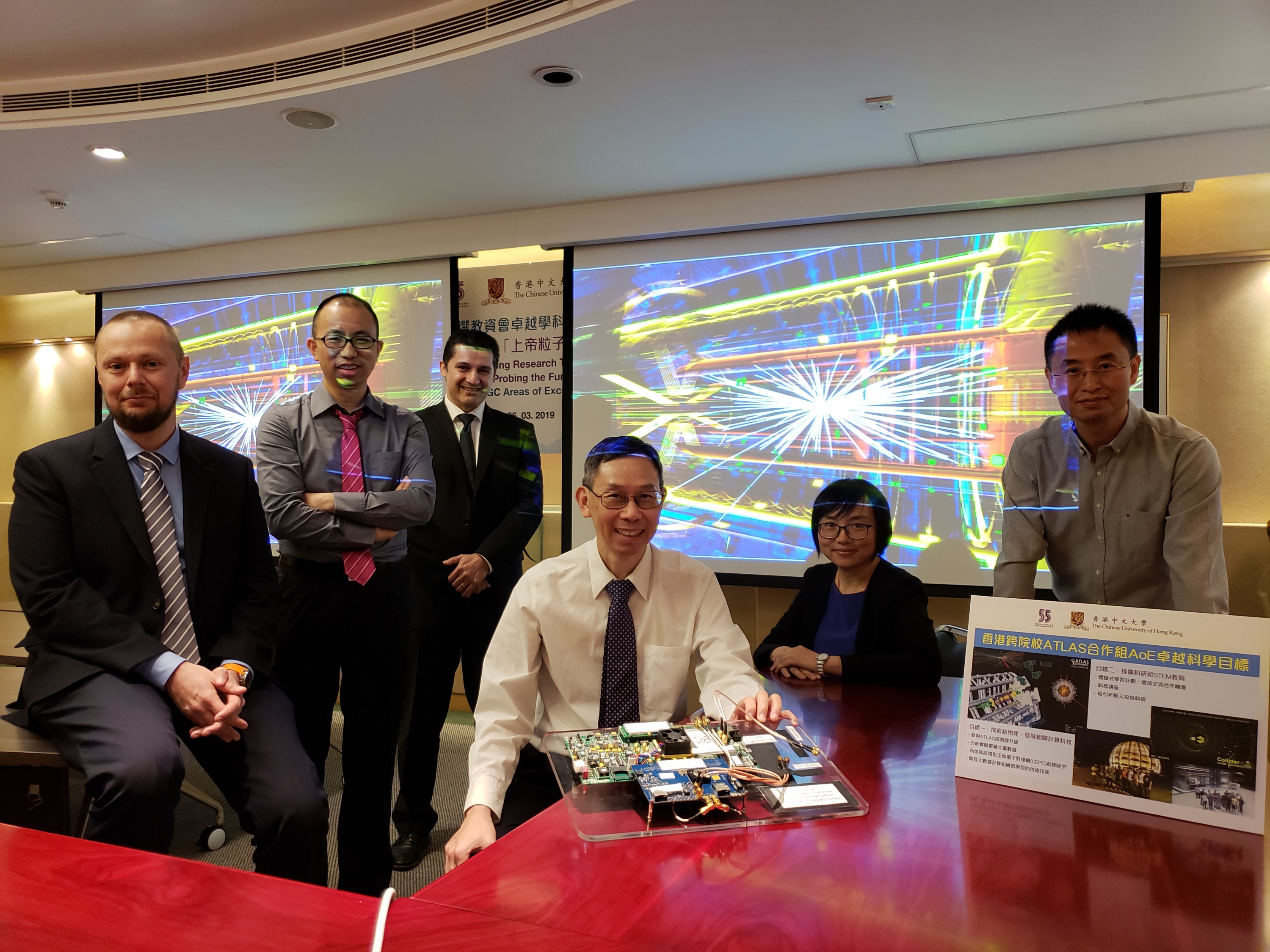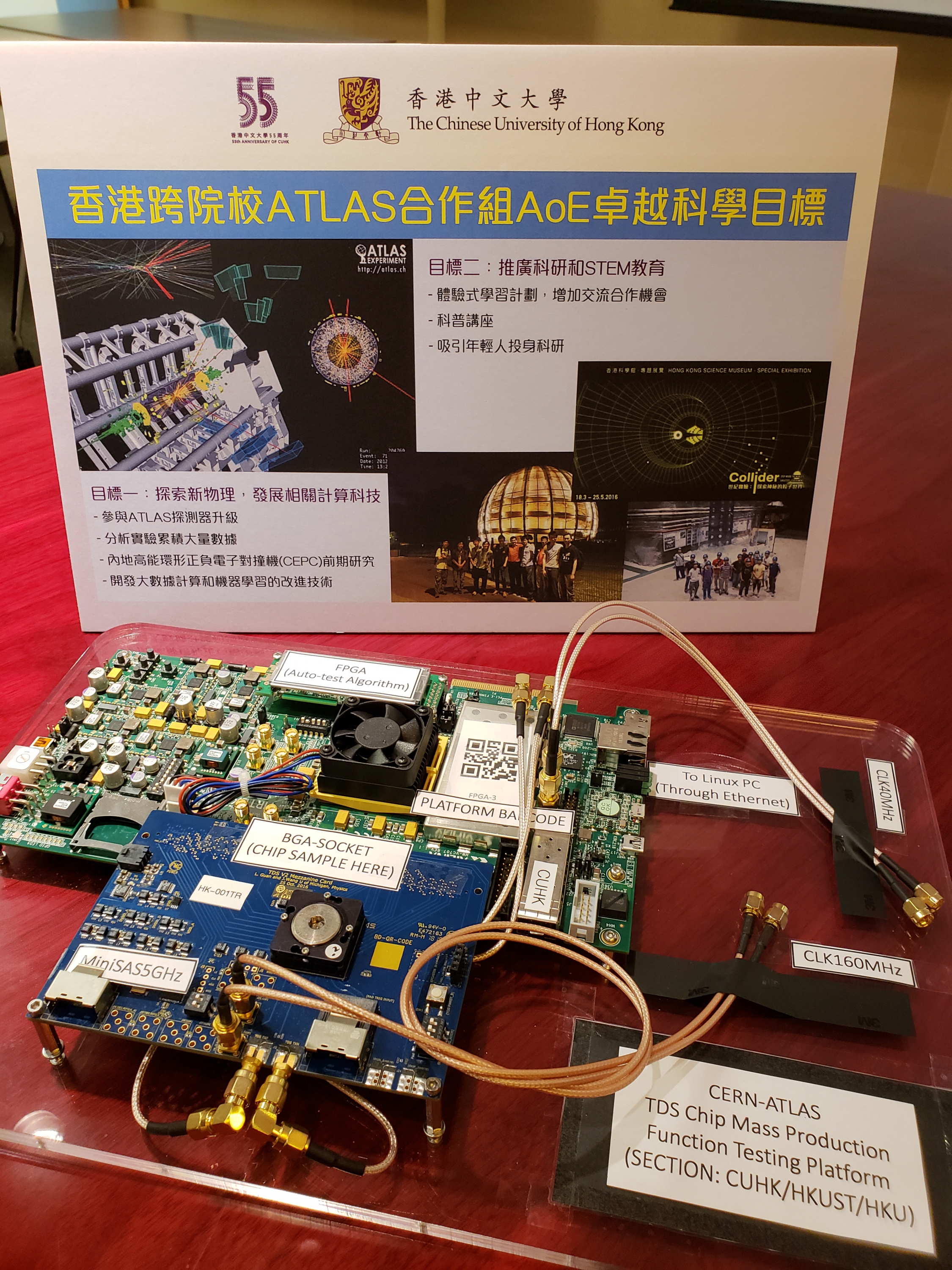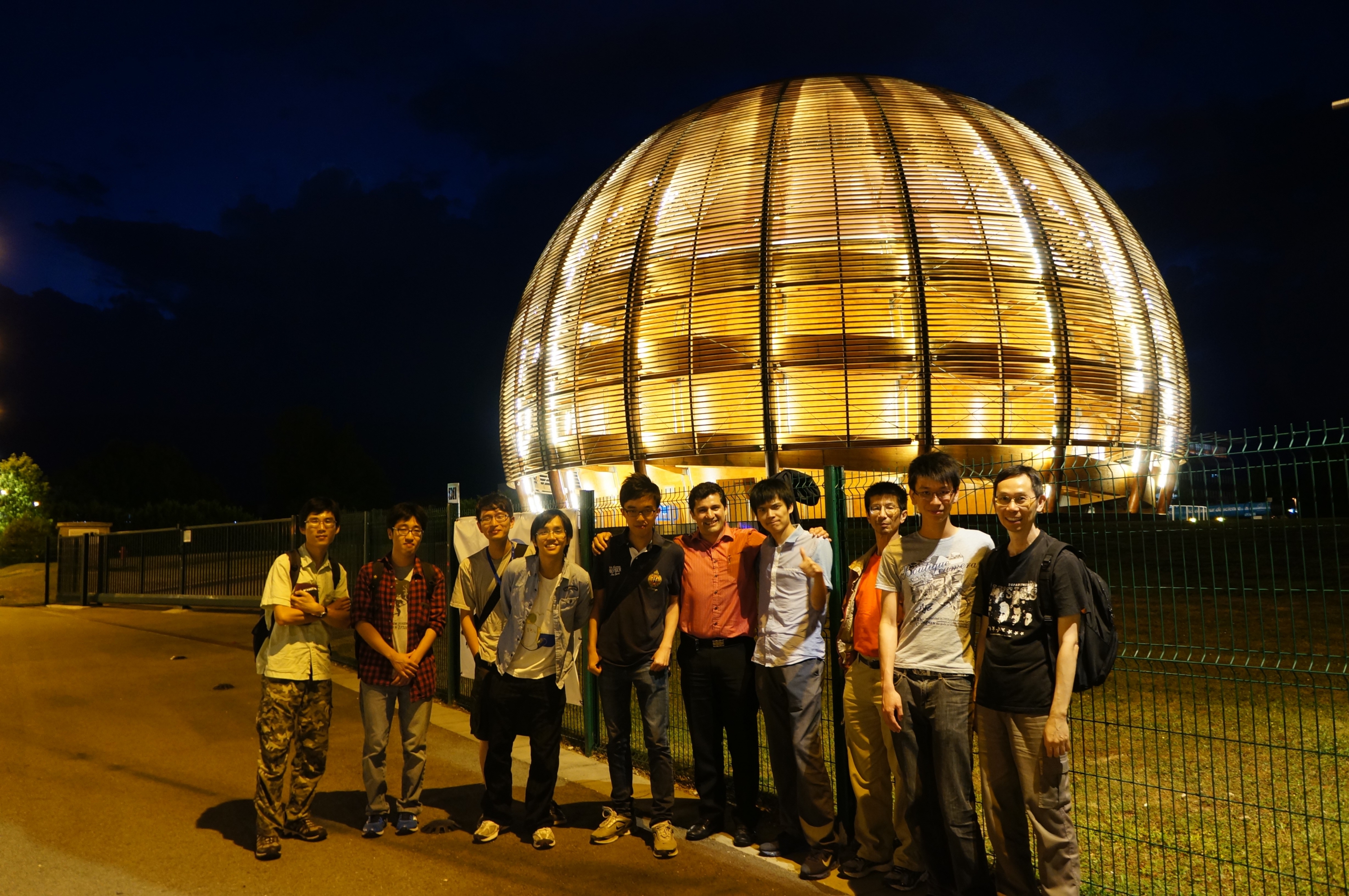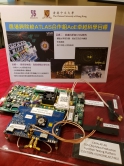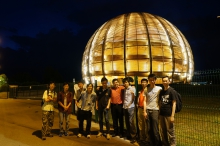News Centre
CUHK-led Research Team Participates in “God Particle” ExperimentRecognised by UGC as Area of ExcellenceFurther Development on Fundamental Physics in Hong Kong and Mainland China
A team of particle physics researchers from across local institutions, led by Professor Chu Ming-chung of the Department of Physics, The Chinese University of Hong Kong (CUHK), working on a project to study the fundamental structure of matter, has recently been awarded funding in excess of HK$78 million from the Areas of Excellence (AoE) Scheme under the University Grants Committee (UGC). The award will boost the team’s involvement in the ATLAS experiment, based at The European Organisation for Nuclear Research (known as CERN). The team will be leading in some areas of Higgs particle properties measurement and the ATLAS detector upgrade, as well as contributing to the R&D work of the proposed Electron-positron Collider in China. The project will substantially raise the profile of Hong Kong scientists and their global influence.
The team comprises of 17 professors and researchers from The Chinese University of Hong Kong, The University of Hong Kong and The Hong Kong University of Science and Technology.
Probing the Fundamental Structure of Matter with High Energy Particle Collisions
Discovering a theory that can explain the origin and fundamental structure of everything in this universe has always been a dream of human kind. According to the Standard Model of Particle Physics, which was built on scientists’ effort over the last couple hundreds of years, everything in the universe, from atoms and cells to stars and galaxies, is made up of elementary particles – six kinds of quarks and six kinds of leptons (such as electrons and neutrinos). These elementary particles interact through four kinds of fundamental interactions (strong, weak, electromagnetic, and gravity), which ultimately govern the evolution of all matters and the universe. However, several breakthroughs in fundamental physics in recent years, including dark matter, dark energy, neutrino oscillations, and the discovery of the Higgs particle (commonly known as “God particle”), point to the incompleteness of the Standard Model, while at the same time providing hints at promising paths to new breakthroughs.
The Higgs particle was discovered in two high energy particle collision experiments (ATLAS and CMS) at the Large Hadron Collider (LHC) at CERN in 2013. It is one of the most significant breakthroughs of modern physics. To measure and characterise the properties of the Higgs particle, including its interactions with other elementary particles, has become an important task in uncovering the particle’s mysteries.
Led by Professor Chu, the Hong Kong research team joined the ATLAS experiment in 2013 and became an official member a year later. The team has made significant contributions to researches on the Higgs particle, including measurement of its spin and parity and its couplings with the standard model particles. They designed new strategies to detect new physics beyond the Standard Model. In addition, the team participated in testing of the ATLAS readout electronic chips, developed new analysis tools, and established an ATLAS Computing Center in Hong Kong.
The LHC and ATLAS detector have been shut down and are undergoing a two-year major upgrade to improve their collision energy and luminosity. The Hong Kong team will actively participate in the upgrade of the ATLAS detector, produce readout electronic boards and carry out R&D on the radiation hardness of readout electronics to enhance the detector’s sensitivity and ability to capture experiment data, and test the new silicon pixel detectors. Furthermore, the team will continue to analyse the huge volume of accumulated data to improve measurements on the properties of the Higgs particle and for more sensitive searches for new physics beyond the Standard Model.
Professor Chu said, “The ATLAS experiment has a far-reaching and significant impact on the further development of particle physics theory, and our work may transform into practical use that benefits society. Supported by three previous UGC Collaborative Research Funds (CRF), the team has become one of the most active ATLAS members and particle physics theory groups in the Asia Pacific region, gaining valuable knowledge and experience. We will grasp the opportunity of the ATLAS upgrade, and will expand our research group and the variety of projects we are involved in. The team will also participate in the R&D for the next generation of particle colliders, particularly the Circular Electron Positron Collider (CEPC) in China, to promote collaboration between Hong Kong and mainland China in scientific research.”
Cultivating a New Generation of Scientific Research Talents Through Engaging in Cutting-Edge World-Class Projects
Besides engaging in cutting-edge research project, the Hong Kong particle physics research group has always attached great importance to cultivating a new generation of talented scientific researchers and actively promoted science education. Since 2000, Professor Chu has created a number of experiential learning programmes designed to promote active and collaborative learning of physics for students. The Department of Physics has been sending undergraduate students to CERN in Switzerland every summer, under the Summer Undergraduate Research Exchange (SURE), providing them with first-hand experience in interacting and collaborating with front-line researchers, and giving them an international perspective on physics research. So far, 121 students have joined the programme (with 16 participating in CERN research), some of whom were inspired and continued to pursue science careers after graduation.
Professor Chu Elected Fellow of the American Physical Society
In 1995, Professor Chu joined CUHK. In 2002, he co-founded the Daya Bay Reactor Neutrino Experiment with Prof Kam-Biu Luk from the University of California, Berkeley, and other professors. It was the first time that a team of Hong Kong scientists had joined a major international fundamental physics experiment. They conducted the Neutrino Experiment in the Daya Bay Nuclear Power Plant and tried to solve some puzzles in particle physics and cosmology.
Professor Chu has consistently been an active promoter of STEM education in Hong Kong. Since 2011, he has given over 70 popular science talks on latest scientific breakthroughs in physics, such as the discoveries of Higgs boson, neutrino oscillations, dark matter, and gravitational waves. He was elected as an American Physical Society 2018 Fellow for his contribution to physics research and STEM education.
About the UGC Areas of Excellence Scheme
The Areas of Excellence (AoE) Scheme was launched by the University Grants Committee (UGC) in 1998. Up to 2018/2019, UGC has awarded 24 Areas of Excellence with exercise grants in support of their researches, in seven rounds of the AoE scheme. Among the 24 research projects, 9 were led by the CUHK researchers. In the most recently announced 8th round of funding results, CUHK was involved in all 3 funded projects.
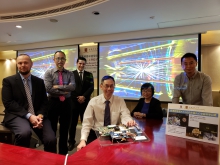
Hong Kong ATLAS research team members are: Dr. Kirill Prokofiev, Department of Physics, HKUST; Prof. Tao Liu, Department of Physics, HKUST; Prof. Luis Roberto Flores-Castillo, Department of Physics, CUHK; Prof. Ming Chung Chu, Department of Physics, CUHK; Dr. Yanjun Tu, Department of Physics, HKU; Prof. Kong Pang Pun, Department of Electronic Engineering, CUHK.
